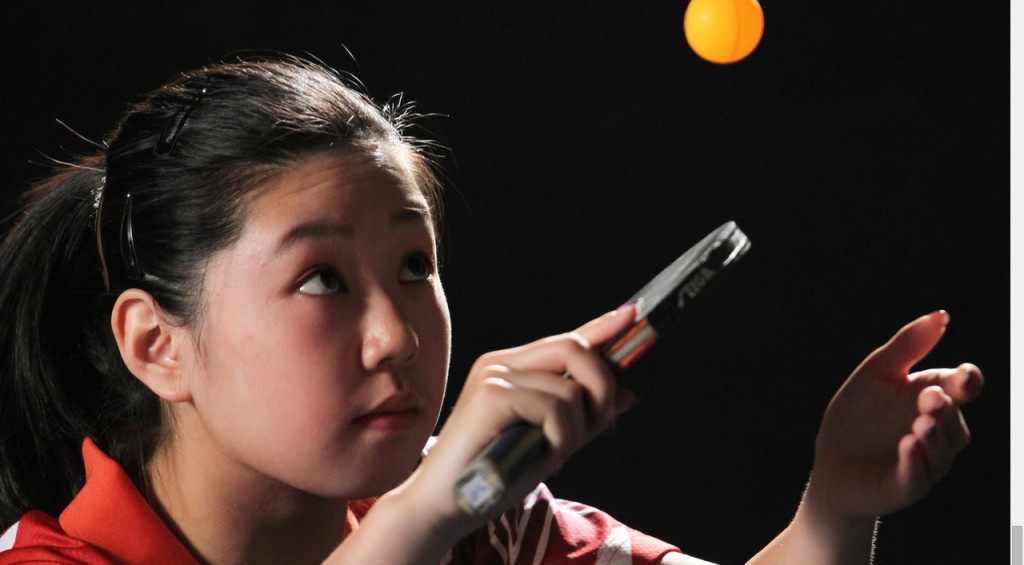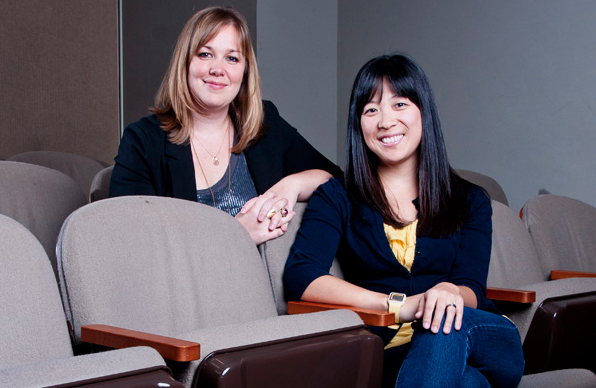- California Assembly OKs highest minimum wage in nation
- S. Korea unveils first graphic cigarette warnings
- US joins with South Korea, Japan in bid to deter North Korea
- LPGA golfer Chun In-gee finally back in action
- S. Korea won’t be top seed in final World Cup qualification round
- US men’s soccer misses 2nd straight Olympics
- US back on track in qualifying with 4-0 win over Guatemala
- High-intensity workout injuries spawn cottage industry
- CDC expands range of Zika mosquitoes into parts of Northeast
- Who knew? ‘The Walking Dead’ is helping families connect
Filmmakers break through with ping-pong documentary ‘Top Spin’
By Tae Hong
Are there similarities between documentary filmmaking and winning an Olympic medal in ping-pong?
Ask Mina Son, one of the talents behind the new table tennis-centric documentary “Top Spin,” and she’d tell you that, yes, she did feel a parallel between the two while holding up a camera to three ping-pong champs for the better part of a year alongside co-director Sarah Newens.
One, you’re not really in it for the money, because there isn’t much of that. And two, it’s not really about the fame, because there’s not a whole lot of that, either.
It’s all about the personal desire for achievement whether you’re making a film or playing a rarely noticed sport, she said, and she saw it in the faces and sweat of the three young players, high school students Ariel Hsing, Lily Zhang and Michael Landers, who live and breathe with a ping-pong paddle in their hands.
The documentary, which won Best Editing in the documentary feature category at the Los Angeles Asian Pacific Film Festival last month, has been screened to warm reception at fests around the U.S. since its premiere last November.
“We hope it shows the sport in a way that you don’t think about,” Son, a second-generation Korean American who hails from Anaheim, said. “It’s not as respected. We want it to be respected. It’s kind of an underground, niche sport that deserves attention.”
Over the span of a year, the two filmmakers hit the road every two weeks, traveling across a dizzying number of U.S. cities and to five countries to catch the kids compete. Their goal? Qualification to — and victory at — the 2012 Beijing Olympics.
As their first feature-length project straight out of Stanford’s documentary and film master’s program, it proved to be a lot more work than they had ever imagined.
“We had one year to follow them to the Olympics, and we had an end goal — you make it or you don’t,” Son said. “That arc was built in.”
The original idea for “Top Spin” began with a 12-minute short on Ariel done by the filmmaking duo for a Stanford project. They first read about her in a news article. Expanded into 80 minutes, with Lily, Michael, and the will of the three young people in quenching an ultimate goal, the weight of a medal on their chests, the doc is what Son calls a “crowd-pleaser.”
Not difficult to believe, considering the uniqueness of the subject. Who makes films about ping-pong when there’s fan-heavy favorites like football and baseball, anyway?
“It’s so much fun. Everybody can do it. I don’t know if there’s a more accessible sport,” Son said.
The stories are powered by the kids’ determination. Their sights were settled not on money (there’s not much of it in the sport to begin with) or fame (ditto this), but on the pure, innate desire to win, she said.
No task was too easy — first, the subjects themselves:
“You know, they’re teens,” Son laughed. “There’s lots of stuff going on. Even if they didn’t have this huge pressure of trying to make it to the Olympics, they’d be hormonal and emotional. But add that extra burden and that extra pressure, and the closer it got to the competitions, we definitely noticed they were more emotional, more anxious.”
Then it was the sport itself, with its convoluted qualification rules and a no-nonsense deal that requires two paddles, one ball and one 9-foot-by-5-foot table.
“It’s sort of not a cinematic sport,” she said. “It’s indoors. It’s one table. Every match looks the same.”
It didn’t take Son and Newens very long to figure out how difficult it was to portray the complexities, the dramatics, of the sport via camera. After two or three tournaments, it was time to bring in set-up, slow-motion shoots.
The trouble was worth it. At the DOC NYC premiere last November, Son watched as Ariel, seated in front of her, broke out in tears in the theater, surrounded by beaming families of the cast.
Son hopes to replicate the experience. Her next project focuses on Rikuzentakata– a small town in Japan in which she taught English for two years post-college — devastated by and still recovering from the 2011 earthquake.
She again partnered with Newens, who will take on editing once more, and has received funding from ITVS.
She may be back at the festival next year — LAAPFF is a special place as any, after all. It fostered her first steps into filmmaking during her time as a volunteer there 10 years ago. She was going through a transitional period, taking care of her sick mother back home in Southern California after Japan.
Guided by the festival to take her first filmmaking course, and later to her very first short about her mother, Son ended up at Stanford. LAAPFF has since shown a few of her shorts; “Top Spin” was her first feature showing.
“It’s such a great feeling,” Son said. “I’ve moved forward and I’ve grown not only as a person but as a filmmaker. Who would have known?”
All the long hours of work put into the film weren’t for naught; they taught her invaluable lessons: have thick skin, believe in the project, walk past rejection, ignore voices of doubt.
Seeing the kids working so passionately was fresh motivation for Son and Newens.
“We said, if they can do it, we can do it, too,” she said. “It’s the idea to put everything out on the line. Who cares what other people think? Just going for it regardless of the outcome.”


















